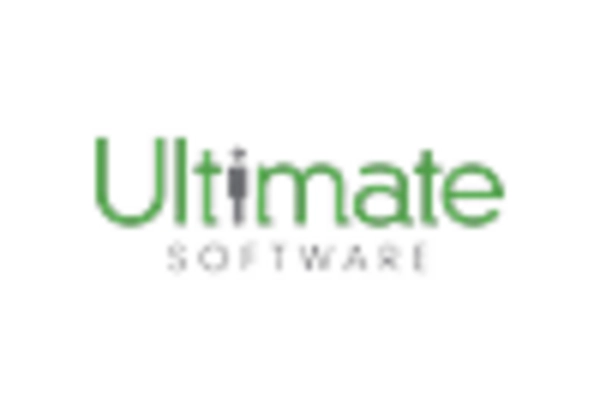Shift Towards Remote Work Solutions
The human capital-management-software market is adapting to the evolving landscape of work, particularly with the shift towards remote work solutions. In South Korea, organizations are increasingly investing in software that facilitates remote employee management, performance tracking, and collaboration. This trend is expected to drive market growth by approximately 12% in 2025, as companies recognize the need for tools that support a distributed workforce. Human capital-management software that offers features such as virtual onboarding, remote performance evaluations, and employee engagement tools is becoming essential. This shift not only enhances productivity but also helps maintain employee morale in a remote work environment, indicating a fundamental change in how organizations approach talent management.
Rising Demand for Workforce Analytics
The human capital-management-software market in South Korea is experiencing a notable surge in demand for workforce analytics. Organizations are increasingly recognizing the value of data-driven insights to enhance employee performance and optimize talent management. In 2025, it is estimated that the market for workforce analytics solutions will grow by approximately 15%, driven by the need for real-time data to inform strategic HR decisions. Companies are leveraging these analytics to identify skill gaps, predict turnover, and improve recruitment processes. This trend indicates a shift towards a more analytical approach in human resources, where data plays a crucial role in shaping workforce strategies. As businesses strive for competitive advantage, the integration of advanced analytics into human capital management systems is likely to become a standard practice.
Focus on Employee Well-being and Engagement
The human capital-management-software market in South Korea is witnessing a growing focus on employee well-being and engagement. Organizations are increasingly aware that a satisfied workforce leads to higher productivity and lower turnover rates. In 2025, it is anticipated that the market will expand by 14% as companies invest in software solutions that promote employee engagement initiatives, mental health resources, and work-life balance. Human capital-management software that includes features for employee feedback, wellness programs, and recognition systems is becoming a priority. This emphasis on well-being not only enhances the employee experience but also contributes to a positive organizational culture, which is essential for attracting and retaining top talent.
Integration of Learning and Development Tools
The human capital-management-software market is evolving with a strong emphasis on integrating learning and development tools. In South Korea, organizations are increasingly recognizing the importance of continuous employee development to remain competitive. The market is projected to grow by 11% in 2025, driven by the demand for software that supports training, skill development, and career progression. Human capital-management software that offers integrated learning management systems enables organizations to provide personalized training experiences and track employee progress effectively. This integration not only enhances employee capabilities but also aligns workforce skills with organizational goals, indicating a strategic approach to talent management that prioritizes growth and development.
Emphasis on Compliance and Regulatory Requirements
In South Korea, the human capital-management-software market is significantly influenced by the increasing emphasis on compliance with labor laws and regulations. Organizations are compelled to adopt software solutions that ensure adherence to local labor standards, which have become more stringent in recent years. The market is projected to grow by 10% in 2025, as companies seek to mitigate risks associated with non-compliance. Human capital-management software that incorporates compliance features helps organizations manage employee records, payroll, and benefits in accordance with legal requirements. This focus on compliance not only protects businesses from potential legal issues but also fosters a culture of transparency and accountability within the workforce.
















